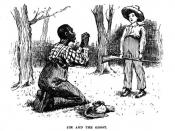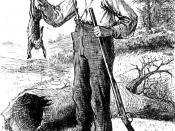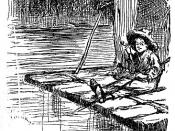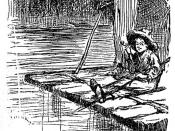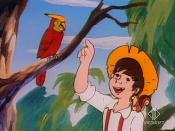Our beliefs are shaped and changed by our surroundings and the environment in which we live. One may see this aspect of human nature in Mark TwainÃÂs "Huckleberry Finn" in chapters XIV-XVI. Circumstances place Huck and Jim living with one another for days. When Huck becomes obligatorily immersed in this close relationship with Jim, HuckÃÂs beliefs regarding friendship and thoughtfulness toward others change from those of a typical reckless Southern white boy to those of a more mature, considerate young man.
In the beginning of chapters XIV-XVI, Twain portrays Huck to be a typical Southern boy with typical Southern values, treating Jim as if he were not a friend on-par with him, but someone on a lower rung of the societal ladder that he resides above. Twain exhibits this feeling of HuckÃÂs in through his writing style ÃÂ he writes every inflection of JimÃÂs black-style speech into the dialogue, exaggerating JimÃÂs poor grammar and speech to a far more noticeable degree than if the reader heard Jim actually speaking.
The effect is almost comical and conveys to the reader the impression that Jim is somewhat inept at speech and should therefore be looked down upon. In chapter XV, Huck plays a trick on Jim and pretends that their separation was a figment of JimÃÂs imagination, showing HuckÃÂs lack of seriousness in dealing with a personal relationship with a black person. However, after Jim mournfully admits his having feared losing Huck, Huck realizes that he does indeed have a unique respect for him as a friend. Huck admits, ÃÂIt was fifteen minutes before I could work myself up and humble myself to a nigger . . . I wouldnÃÂt done that one if IÃÂd ÃÂaÃÂ knowed it would make him feel that wayÃÂ (86). Although Huck still refers to Jim as a ÃÂnigger,ÃÂ showing the still-present, yet diminished influence the Southern belief still has on him, Huck certainly views Jim on a more intimate level, one in which he cares about JimÃÂs feelings. TwainÃÂ down-to-earth style of expressing HuckÃÂs emotions in this excerpt plainly shows HuckÃÂs newly-realized appreciation for JimÃÂs feelings.
HuckÃÂs change in feeling is significant. It reveals an aspect regarding human nature to the reader: our feelings and beliefs are shaped by our surroundings. While HuckÃÂs feelings toward blacks in the beginning of the novel are very characteristic of the Southern belief system, which may show HuckÃÂs societal influences, HuckÃÂs ability to change and develop a sincere respect for Jim as a true friend shows how oneÃÂs beliefs can also change when immersed in a new environment.
